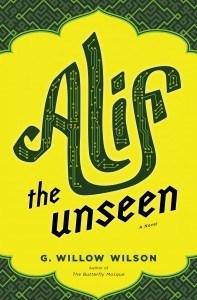
One of my favorite books of the past year, Alif The Unseen (Grove Press, 2012), is a rip-snorting adventure tale of computer hackers and mythical genies set in an imagined Arab Spring, infused with a critique of the binary and an embrace of bothness. American author G. Willow Wilson previously wrote a graphic novel set in Cairo as well as a book about her own conversion to Islam while living in Egypt. She builds her latest story around characters who bridge worlds: two religions, two cultures, two classes, reality and fantasy, the seen and the unseen, the sacred and the profane, the digital and the analog, the love of computers and the love of books.
Alif, a shaggy young hacktivist and the eponymous hero, was born to an Arab Muslim father and an Indian mother who converted from Hinduism to Islam. Converts, expatriates, and interfaith children all share the experience of defending our identities when society attempts to label us in ways that cause cognitive dissonance. Wilson depicts this conflict, while at the same time celebrating the benefits of religious and cultural flux.
Neighbors taunt that Alif’s mother is “still secretly a Hindu.” Alif believes his father considers him “a problematic son with dark-skinned pagan blood in his lineage, the product of a union unsanctioned by his grandparents…” A friend, when angered, says, “…I could bash your half-Arab nose right in.” Such challenges will sound familiar to those of us in multicultural and multifaith families.
But at the same time, Wilson portrays the positive side of complex identity: the creative outside-the-box thinking, wry comic insider-outsider perspective, and empathy for the other. Alif’s crew of allies includes a half-man-half-beast jinn, a blond American convert to Islam, and a prince masquerading as a pauper. At the apex of a dizzying plot in which they battle dark political forces, crash computers, and flee through metaphysical time-zones, a friendly sheikh comments “…something fundamental has change about the world in which we live. We have reached a state of constant reinvention.”
Like Yann Martel’s much denser novel Life of Pi, Alif the Unseen is a global coming-of-age adventure tale with philosophical and religious themes. But this cyberpunk thriller, brimming with action and snappy dialogue, is a much quicker read.
Wilson portrays both Islam and the Middle East with affection as part of a 21st-century in which we are all recombining, defying dualism, traveling as a joyously motley crew into the future together. Those of us with complex identities (which, soon, will be all of us) will see ourselves reflected in Wilson’s genre-defying and very contemporary book. I plan to pass it on immediately to my two interfaith teenagers.

